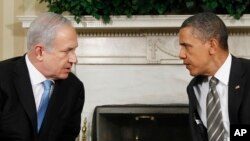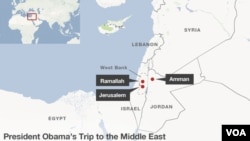WASHINGTON —
As President Barack Obama arrives in Israel on the first leg of his Middle East trip next week, many Israelis are hoping his visit will reaffirm his commitment to Israel. And when he visits the Palestinian city of Ramallah, many Palestinians are expecting a clear U.S. commitment to creation of an independent Palestinian state.
The president himself has signaled he will not be unveiling any great diplomatic initiatives during the trip, and Middle East experts, as well as Arab and Jewish-American leaders, have scaled back their expectations accordingly.
James Zogby, president of the Arab-American Institute, says those lower expectations may be wise because the difficulties that frustrated Mr. Obama’s efforts during his first four-year presidential term still exist today. He says these include difficult political situations in both Israel and the Palestinian territories and a political environment in Washington that gives the president little room to maneuver.
The visit beginning on Wednesday will be Mr. Obama’s first to Israel as president, and Ken Jacobson, deputy national director of the Jewish Anti-Defamation League, expects it may turn out to be largely symbolic.
“I do not expect any major particular development…,” Jacobson says, adding that Prime Minister Benjamin Netanyahu is still pulling together a governing coalition after divisive parliamentary elections. “The most important thing is to reassure the Israeli public that they have a friend in the White House.”
Jacobson suggests the visit should help ease distrust that developed when President Obama did not visit Israel after his 2009 speech in Cairo appealing for better relations between the U.S. and the Muslim world.
The right message
Both Arab and Jewish-American leaders emphasized the need to use the trip to deliver the right message to both the Israelis and the Palestinians.
“He needs to say that peace is in the interest of both sides and that the U.S. will be there to help,” Jacobson said. “If the Israelis were reassured that the president will continue the special relationship and be a fair interlocutor in any peace process, that will encourage the Israelis, and hopefully the Palestinians, to consider moving down the road.”
James Zogby says more is needed. He says the president should to go beyond the politicians and appeal directly to the Israeli and Palestinian people.
“The president should reach out to both publics, as President Clinton did in 1998, by going over the heads of the leaders,” Zogby said. “Obama should speak directly to them saying, ‘This is the support the U.S. will give to you, but this is what we need from you.’”
The White House has not given advance notice of the president’s expectations, and Secretary of State John Kerry has described the stops in Jerusalem, Ramallah and Amman, Jordan as a regional listening tour. But Marwan Muasher, a former Jordanian foreign minister and now a scholar at the Carnegie Endowment for International Peace in Washington, says the time for listening is over.
“There is a window of only a few months until the hope for a two-state solution is lost for good,” Muasher says, referring to the idea of creating Palestine as an independent nation alongside Israel.
To get the diplomacy moving, Muasher says, President Obama needs to develop strong personal ties with the leaders in the region.
“It is no secret that Obama and Netanyahu have had a rocky relationship over the years,” he says, “so they need to mend their personal ties and give a positive impression during the visit.”
What comes next?
President Obama has said he will not present a U.S. peace plan while in the Middle East, raising the question, what will he do when he returns to the White House?
Zogby expects the president to formulate an “American peace initiative” within the year, taking into consideration both Israeli and Palestinian concerns. Zogby suggests that in order for the U.S. to lead a successful peacemaking effort in the Middle East, President Obama should encourage Palestinian reconciliation, using Qatar’s efforts to persuade the Palestinian political and militant group, Hamas, to be a partner in the peace efforts.
Muasher is less optimistic this will happen.
“The peace process is low on Obama’s list of priorities, and there are no indications that Washington will make any concerted effort to find a solution to the Palestinian-Israeli conflict,” he said.
Jacobson of the Anti-Defamation League says the Obama administration should refrain from applying too much pressure to achieve peace.
“That is not the way things happen in a positive way,” he said. “Peace proposals should come out of willingness and eagerness, and not by some perception of pressure from the U.S. Pressure from the U.S. ends up sending the wrong message, both sides have to make concessions, both sides have to compromise.”
The president himself has signaled he will not be unveiling any great diplomatic initiatives during the trip, and Middle East experts, as well as Arab and Jewish-American leaders, have scaled back their expectations accordingly.
James Zogby, president of the Arab-American Institute, says those lower expectations may be wise because the difficulties that frustrated Mr. Obama’s efforts during his first four-year presidential term still exist today. He says these include difficult political situations in both Israel and the Palestinian territories and a political environment in Washington that gives the president little room to maneuver.
The visit beginning on Wednesday will be Mr. Obama’s first to Israel as president, and Ken Jacobson, deputy national director of the Jewish Anti-Defamation League, expects it may turn out to be largely symbolic.
“I do not expect any major particular development…,” Jacobson says, adding that Prime Minister Benjamin Netanyahu is still pulling together a governing coalition after divisive parliamentary elections. “The most important thing is to reassure the Israeli public that they have a friend in the White House.”
Jacobson suggests the visit should help ease distrust that developed when President Obama did not visit Israel after his 2009 speech in Cairo appealing for better relations between the U.S. and the Muslim world.
The right message
Both Arab and Jewish-American leaders emphasized the need to use the trip to deliver the right message to both the Israelis and the Palestinians.
“He needs to say that peace is in the interest of both sides and that the U.S. will be there to help,” Jacobson said. “If the Israelis were reassured that the president will continue the special relationship and be a fair interlocutor in any peace process, that will encourage the Israelis, and hopefully the Palestinians, to consider moving down the road.”
James Zogby says more is needed. He says the president should to go beyond the politicians and appeal directly to the Israeli and Palestinian people.
“The president should reach out to both publics, as President Clinton did in 1998, by going over the heads of the leaders,” Zogby said. “Obama should speak directly to them saying, ‘This is the support the U.S. will give to you, but this is what we need from you.’”
The White House has not given advance notice of the president’s expectations, and Secretary of State John Kerry has described the stops in Jerusalem, Ramallah and Amman, Jordan as a regional listening tour. But Marwan Muasher, a former Jordanian foreign minister and now a scholar at the Carnegie Endowment for International Peace in Washington, says the time for listening is over.
“There is a window of only a few months until the hope for a two-state solution is lost for good,” Muasher says, referring to the idea of creating Palestine as an independent nation alongside Israel.
To get the diplomacy moving, Muasher says, President Obama needs to develop strong personal ties with the leaders in the region.
“It is no secret that Obama and Netanyahu have had a rocky relationship over the years,” he says, “so they need to mend their personal ties and give a positive impression during the visit.”
What comes next?
President Obama has said he will not present a U.S. peace plan while in the Middle East, raising the question, what will he do when he returns to the White House?
Zogby expects the president to formulate an “American peace initiative” within the year, taking into consideration both Israeli and Palestinian concerns. Zogby suggests that in order for the U.S. to lead a successful peacemaking effort in the Middle East, President Obama should encourage Palestinian reconciliation, using Qatar’s efforts to persuade the Palestinian political and militant group, Hamas, to be a partner in the peace efforts.
Muasher is less optimistic this will happen.
“The peace process is low on Obama’s list of priorities, and there are no indications that Washington will make any concerted effort to find a solution to the Palestinian-Israeli conflict,” he said.
Jacobson of the Anti-Defamation League says the Obama administration should refrain from applying too much pressure to achieve peace.
“That is not the way things happen in a positive way,” he said. “Peace proposals should come out of willingness and eagerness, and not by some perception of pressure from the U.S. Pressure from the U.S. ends up sending the wrong message, both sides have to make concessions, both sides have to compromise.”





